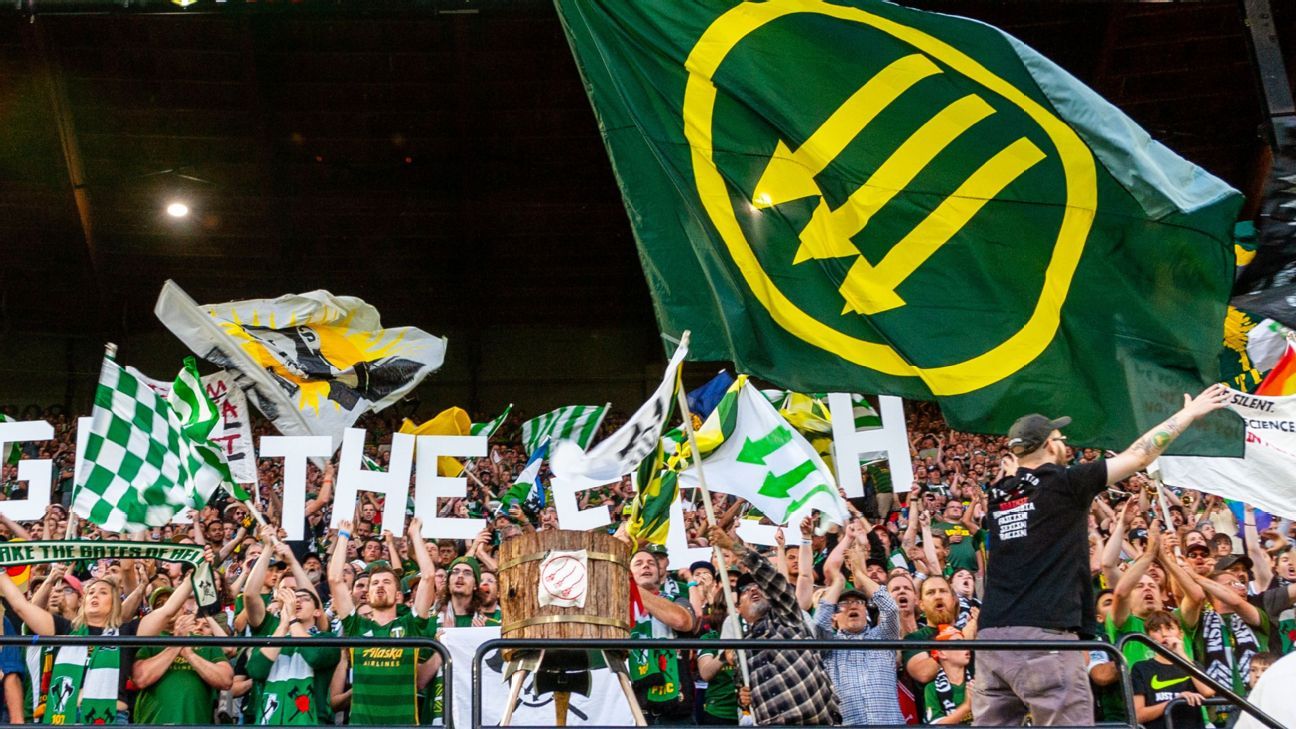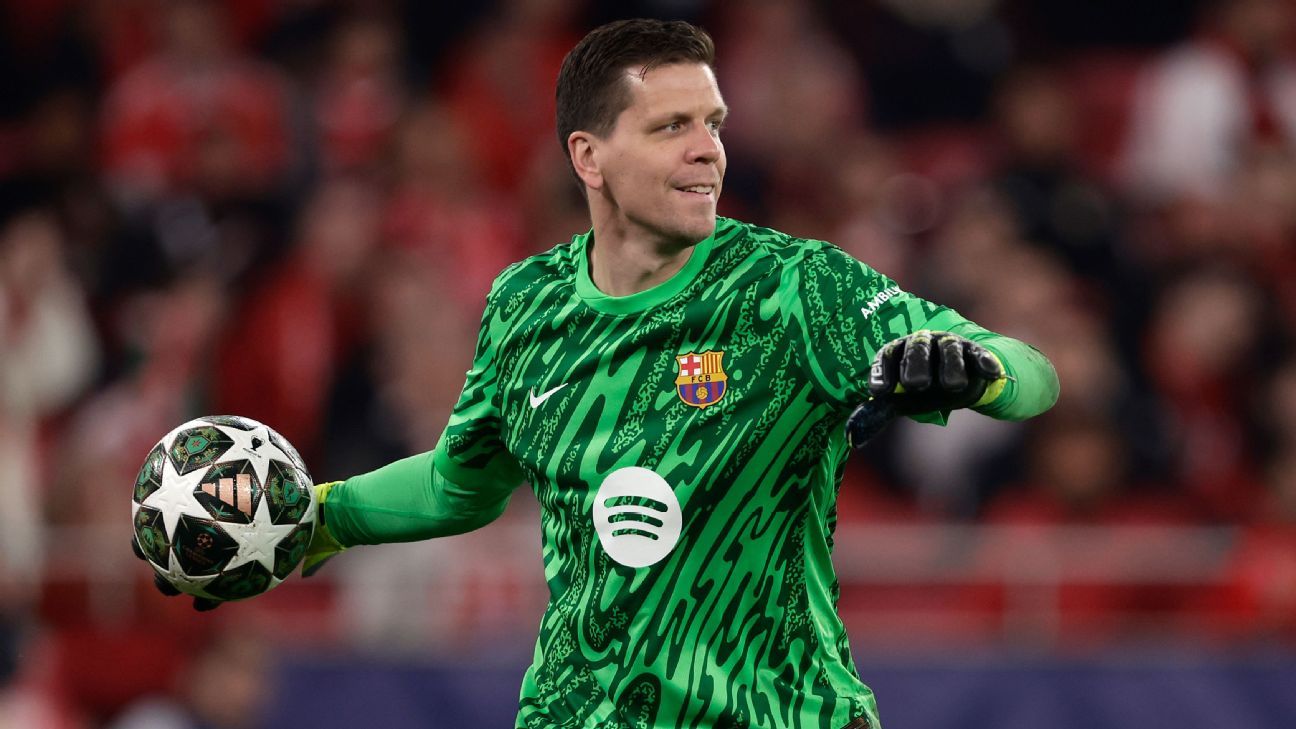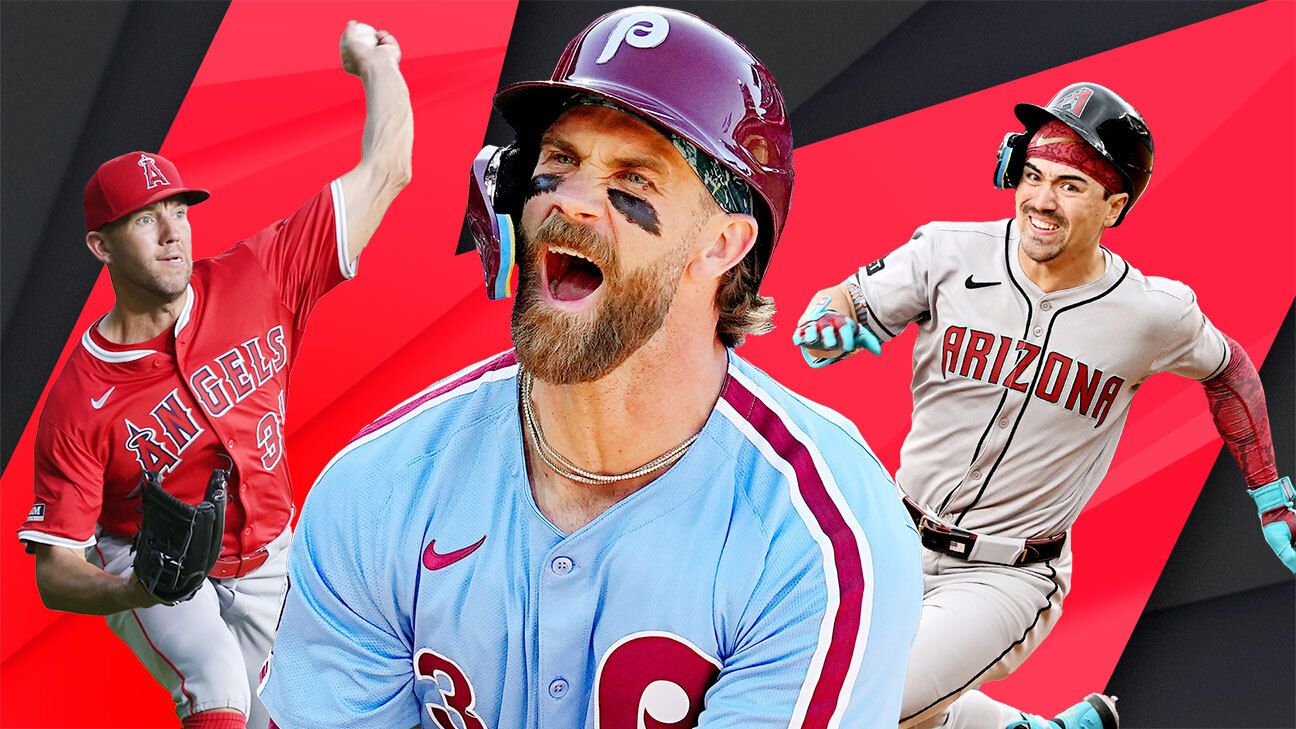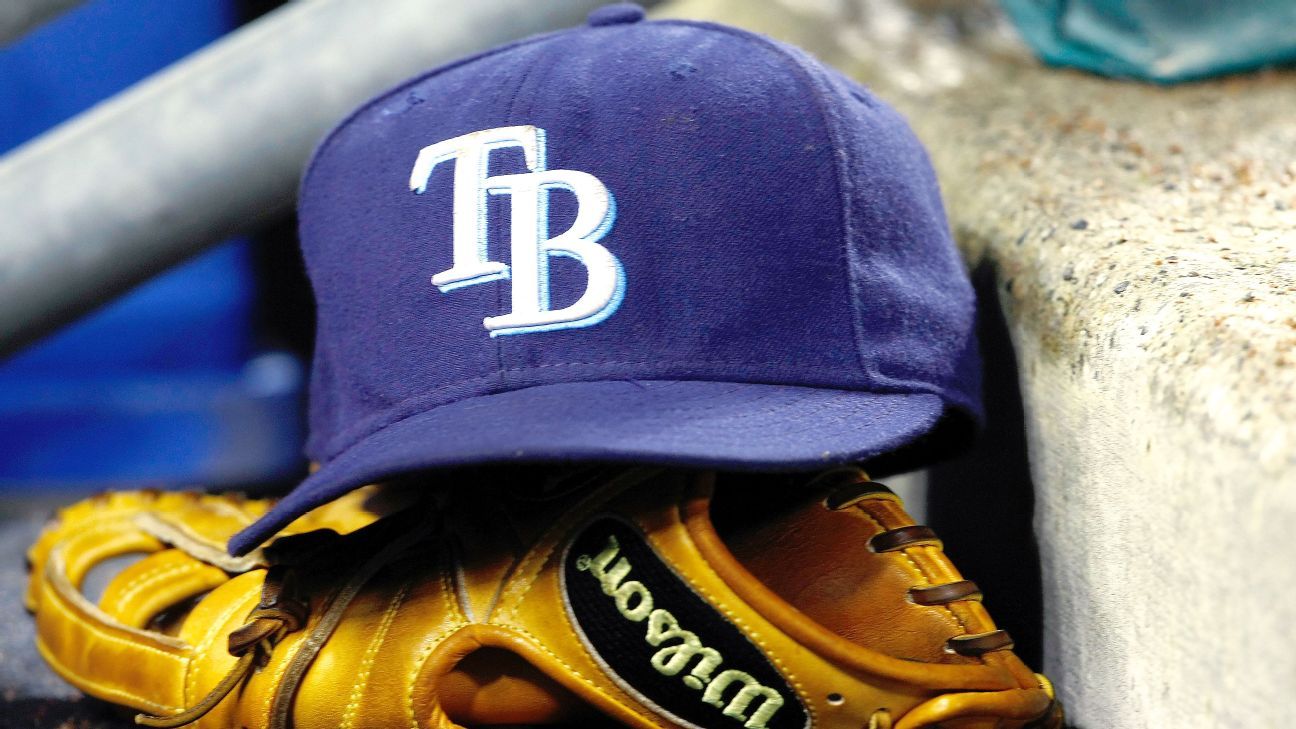
PORTLAND, Ore. -- It's about three hours to go until the kickoff of the Portland Timbers' biggest game of the year, a Cascadia Cup clash against their bitter rivals, the Seattle Sounders. The match is arguably the pinnacle of Major League Soccer's Rivalry Week on a balmy Friday night.
On the surface, all appears normal. But the Timbers Army (TA), in conjunction with their Sounders counterparts, the Emerald City Supporters and Gorilla FC, have planned a protest over MLS's in-stadium ban on political signage. The league has banned the waving of any flag it deems political, including the Iron Front, a logo consisting of three arrows pointing down and to the left. The Iron Front was an anti-Nazi paramilitary group from the 1930s but is now connected with the growing "Antifa" (anti-fascism) movement in the U.S., which is comprised of amorphous, autonomous groups that stand in opposition to fascism and far-right ideology.
- MLS Power Rankings: Philly, Atlanta surge into top three
- Marshall: Vela proves his commitment to LAFC
- Among the Chugs: Phoenix Rising's undefeated dollar beer night
At the Fanladen, the de facto clubhouse of the Timbers Army, Sheba Rawson is attending to her duties as president of the 107ist, the organizational arm of the TA and the Rose City Riveters, the supporters of the NWSL's Portland Thorns. At the moment, this consists mainly of making sure the denizens of the Timbers Army section get their tickets with minimum fuss.
Rawson's choice of jewelry, a pair of yellow earrings in the shape of the Iron Front symbol, confirms where she stands on the issue: the image is one of inclusion.
"That's the flag we would like to fly," says Rawson. "It's an odd thing for the league to send a message that that flag is offensive. If I can't make that appeal to [the front office] we have to do the one thing we can do, which is to take away the value that we add to the business."
The MLS Fan Code of Conduct prohibits fans from "using (including on any sign or other visible representation) political, threatening, abusive, insulting, offensive language and/or gestures, which includes racist, homophobic, xenophobic, sexist or otherwise inappropriate language or behavior." In MLS's eyes, "antifa" is a political organization, meaning the flying of any flag connected to it is forbidden.
Hours earlier, the three groups put out a statement that they not only want the ban on the Iron Front flag lifted, they want the word "political" removed from the league's Fan Code of Conduct, as well as to work with human rights experts on a new version that ensures fan safety. Their stance is backed by the Independent Supporters Council, an umbrella organization advocating for supporter groups in MLS.
So the groups have a unique kind of protest planned. There will be no colorful "tifo" banners hoisted before the match. For the first 33 minutes -- an ode to 1933, the year the Iron Front was banned by the Nazis -- the supporter groups from both teams will be silent. No chants, no singing, no drumming.
The irony of the standoff is that in a bid to differentiate itself from other North American sports leagues, MLS has long cultivated a fan culture that is urban, edgier and more progressive, as evidenced by the advertisements hyping up the league. Portland and Seattle are prime examples of this passion, but the tension surrounding both sets of supporters invokes the sense that MLS is trying to curtail precisely the kind of supporter culture -- including the political statements that some ascribe to -- that it has coveted and cultivated since year one.
No fan group is monolithic, of course, and so it proves with the Timbers fans in attendance. At the main entrance to the Timbers Army section, Daniel Ribeiro is among the fans waiting for the gates to open. He's wearing a vest with a message pinned to the back that reads "This Mustache Kills Fascists," a parody of the saying "This Machine Kills Fascists" popularized by folk singer Woody Guthrie in the 1940s, and altered by the Gypsy punk band Gogol Bordello.
Ribeiro is fully in support of the Timbers Army's stance. The latest instance of demonstrations in Portland involving the alt-right group the Proud Boys and antifa are on his mind.
"Its a symbol of inclusion," said Ribeiro about the Iron Front flag. "It's a symbol that's against a lot of the hate and angry rhetoric and fascist intents that we've been seeing from a lot of ultra-right-wing groups that have been coming to our town doing these things. It's also a symbol that we've used at the stadium here for years. It's not a symbol of hate."
That support is universal at this entrance to the stadium, but it's less fervent at other gates.
"I'm not a fan of antifa," said Portland resident Jim Keyes, as he prepared to enter Providence Park. "They're a counter group, the Proud Boys are just as bad. The whole thing is just kind of a mess for Portland. If you want to protest, protest. But you don't have to be violent, you don't have to be destructive, you don't have to be a jerk about it."
While one fan who declined to be identified said he thinks the protest is "stupid, I'm here to watch a soccer game," half of the 20 people approached by ESPN weren't even aware that a protest was about to take place, or that it was about the Iron Front flag.
Providence Park is known for its noise and energy, giving it one of the best fan atmospheres in North America. But for the first half-hour, the protest is having its intended effect as the crowd is oddly quiet. An occasional "Let's Go Timbers!" chant rings out. Even when Seattle's Cristian Roldan puts the Sounders ahead in the 22nd minute, the noise level isn't near what one would expect, and there are signs of subtle protest, too. Three fans mimic the Iron Front symbol by holding giant, pink cardboard cutouts of arrows, pointing them down and to the left. A banner in the north end has "Fe," the chemical symbol for iron, and then the word "Front" underneath it.
As the game clock strikes 33:00, flags of all kinds sprout up from the crowd and the volume turns up to 11. The Timbers Army belts out "Bella Ciao," an Italian anti-fascist anthem, and doesn't stop until halftime. The number of Iron Front flags visible easily reaches double figures. Their Seattle counterparts respond in kind and the atmosphere reaches a level you'd expect from this intense rivalry. The fact that the game ends with Seattle winning 2-1 is almost secondary.
Afterwards, Portland defender Zarek Valentin addressed the media wearing a T-shirt with the Iron Front logo, while Seattle goalkeeper Stefan Frei voiced his support for the stance the fans had taken. Two days later when the Thorns took on the Chicago Red Stars, the Rose City Riveters displayed the Iron Front flag. Christine Sinclair showed up at the stadium in an Iron Front t-shirt.
Ask members of the Timbers Army when the Iron Front flag first started being displayed at Portland matches, and no one can give an exact answer. However, it's been a presence for years, usually draped next to the "Timbers Army" banner near the capo stand in Providence Park's north end.
The Timbers Army isn't alone. As recently as 2017, support for anti-fascism has been spotted at stadiums in New York, Montreal and Dallas. Fans of NYCFC have expressed concerns to team management about the presence of far-right elements at their home matches.
1:15
Seattle hang on for big win at Portland
Goals from Cristian Roldan and Raul Ruidiaz proved just enough for the Seattle Sounders over arch-rivals Portland Timbers. To watch MLS sign up to ESPN+.
The flag's presence didn't become problematic until this season, when MLS's effort to revamp its Fan Code of Conduct was completed. In recent years, the league noticed that signs that espoused what it called "political views" were visible in its stadium and decided to ban them. MLS instructed its teams before the season that displaying the Iron Front image would be prohibited.
"The vast majority of MLS fans are there to enjoy the game," said MLS president and deputy commissioner Mark Abbott via phone. "As part of the Fan Code of Conduct, the league and the clubs believe that the promotion of outside political organizations in our stadiums is not appropriate."
The Fan Code of Conduct says a display of political signage is a "threat to the safety of the event," but a statement put out by the Timbers front office on Aug. 19 revealed another motivation. They don't want it seen on television.
"For obvious reasons banners and signs are widely visible to the broader stadium and television audience and thusly fall under a different set of guidelines," the statement read.
Adding the ban on political signage to the Fan Code of Conduct seems to be a solution in search of a problem, especially when signs that explicitly state positions like "anti-fascist" or "anti-racism" are still allowed. Fans are also allowed to wear the Iron Front symbol on T-shirts.
During an Aug. 4 match against D.C. United, Philadelphia Union midfielder Alejandro Bedoya yelled into an on-field mic, "Congress, do something now. End gun violence. Let's go!" Bedoya's plea not only went unpunished by the league, he was named MLS Player of the Week.
The flag's presence would have likely gone unnoticed by the majority of fans had MLS not made the change to the Fan Code of Conduct. Now the ban has become amplified, with some fans at other MLS stadiums showing solidarity through the hashtag #AUnitedFront.
"MLS is stepping into exactly the same trap that the NFL did with Colin Kaepernick," said Laurent Dubois, a history professor at Duke University and author of the blog Soccer Politics. "After he kneeled for the anthem, if the NFL said, 'We respect people's right to free speech. That's great, and he's an individual who has opinions,' the whole thing would basically have gone away.
"In [Portland's] case, it's only going to raise the stakes for this, and I think MLS is only going to have more confrontations because I think it's very unlikely that fan groups will easily relent on this point."
More than one MLS executive has pointed out that other North American sports leagues are not as tolerant of signage in their stadiums, though this is usually spelled out at the team or stadium level and not as a league-wide policy. But MLS has reduced what is permissible, rather than maintaining or expanding it. That stance has led to allegations that MLS (intentionally or not) is sending a signal to alt-right elements that they are welcome. The presence of Proud Boys members at a Seattle Sounders pregame March to the Match on Aug. 4 is often cited as proof, though MLS argues that it has no control over what happens outside its stadiums.
"That's just patently untrue," said Abbott about the allegations. "If you take a look at our Soccer For All campaign, our commitment to issues of diversity and inclusion are strong. We have a strong record of opposing racism, homophobia and xenophobia, and the thought that the league, in any way, shape or form is supportive of hate speech or hate groups is just not true. We condemn all hate speech."
There are certainly instances of MLS backing up its words with action. It has suspended players for using homophobic slurs on the field. Real Salt Lake recently fired manager Mike Petke for a post-game tirade at officials that included a series of homophobic slurs. In 2014, the Timbers were the first professional sports team to support Oregon's gay marriage equality law.
But whether MLS likes it or not, the fact remains that its stance has struck a nerve in the Pacific Northwest, especially given the demonstrations that have taken place between alt-right groups and antifa, which in some cases have turned violent. The feeling that fans who are part of marginalized groups are now feeling less safe isn't going to go away.
"These types of policies ignore the fact that there are whole groups of people that enter those stadiums that are not allowed to be apolitical," said Brenda Elsey, an associate professor of history at Hofstra University, and a contributor to the podcast "Burn It All Down."
She added, "Alexi Lalas is fine," in reference to the Fox Sports analyst who tweeted out his support of the league's policy. "I'm sorry if he's not enjoying seeing those signs. But there's a whole lot of people that don't get to leave that outside. So I think this policy is insensitive to that fact."
In addition to her academic duties, Elsey is the lead development officer in the Americas for the FARE Network, an organization that seeks to combat inequality and bigotry in the sport of soccer. She acknowledges that athletes, from Kaepernick to the Cal women's basketball team wearing "Black Lives Matter" shirts in 2014, have long been advocates for social change, and these protests are largely a result of grassroots movements.
But protests like the one in Portland are a relatively new phenomenon at sporting events in the U.S. Last year, a grassroots movement helped keep the Columbus Crew in Ohio's capital. More recently, "Equal pay!" chants could be heard at the Women's World Cup final. In the 1990s, fans of the New York/New Jersey MetroStars (now the New York Red Bulls) fended off an attempt by far-right elements to maintain a presence in the stands.
What made Portland's protest different was that it saw rival sets of fans working together in a highly coordinated way to drive home their message of anti-fascism and anti-racism.
"Historically, you see more anti-Nazi, anti-fascist protests where there are more neo-Nazis and neo-fascists, like in Europe," said Elsey. "I think what is going on here is pretty new for the U.S. because for the most part that kind of far-right wing activity hasn't been part of U.S. soccer culture."
There's also the fact that whatever remains of the boundary involving sport, politics and social issues, it is eroding further due to the intersection of government policies, their impact on minority communities and the decidedly multi-cultural bent of MLS supporter culture.
"I think a lot of these things are connecting, and it feels like fascism," said Elsey. "There's a reason that people are feeling particularly sensitive about keeping MLS and keeping U.S. Soccer away from that. It's about making people feel safe."
Talking to people in the Timbers organization, there is a sense that they are caught in the crossfire. While the Timbers have publicly supported the policy, there is a feeling that the rollout by MLS was poorly communicated and that there wasn't enough direct engagement with fans. It was the Timbers front office that pushed the league to have the "anti-fascist" and "anti-racism" signs allowed. One portion of the Timbers' aforementioned statement hints at how the club is attempting to straddle the issue.
"We didn't make the rule banning the Iron Front on signs but we understand it and support it," the statement read.
Some in the Timbers organization feel it is taking the hit while the league sits in the background, angst that is exacerbated by the fact that the Timbers front office and the Timbers Army are largely in alignment in terms of their values.
This frustration seemed to get the better of Timbers owner Merritt Paulson after Portland's game that night. Sources confirmed that in one exchange with a fan, he stated he was none too happy with the Timbers Army silent protest, and felt it had undercut the team's home-field advantage. By the next morning, a clearer perspective had taken root.
"Our fans are and will always be the heart of our club," Paulson told ESPN. "We respect their decision to make their voice heard or not heard in this case. I also proudly stand by the ideals of the Timbers. We have a long history that speaks louder than words."
The fans are frustrated as well, though obviously for different reasons. MLS told ESPN that a cross section of owners and executives at both league and team level have decided what crosses the line and what doesn't, but the vague nature of the word "political" has led to confusion and uneven enforcement at matches. What exactly constitutes political? Is the rainbow flag used by the LGBTQ community political? (In an interview with ESPN last month, MLS commissioner Don Garber said it isn't, though he declined to discuss other examples of what is deemed "political.") Then there are the military appreciation nights with political overtones.
At an Aug. 17 game at Dignity Health Sports Park between the LA Galaxy and the Sounders, ECS co-president Shawn Wheeler had an "Anti-Fascist, Anti-Racist, Always Seattle" banner -- seemingly within the rules -- confiscated because according to MLS the banner wasn't cleared with stadium security beforehand. (The slogan has been championed by the ECS and was recently co-opted by the Sounders organization, even featuring as the text on the team pennant for the recent trip to Portland.)
Wheeler confirmed to ESPN that the banner was snuck in after being told he couldn't bring it inside. He contends that after unveiling the banner in the first half he was approached by someone wearing an MLS credential and was told, "We want both sides to be able to come and watch games without politics." When the banner was shown again in the second half, he was ejected.
Abbott said he hadn't been able to corroborate that the exchange between Wheeler and the MLS employee took place, but said that, "if the implication is that we want to allow people who are espousing hate speech or white supremacy or anything like that, that's not something we are looking to allow in our stadiums and we wholeheartedly condemn it."
Wheeler isn't altering his stance in any way, despite getting ejected.
"I have no regrets about sneaking the banner in," Wheeler says. "I'm proud to say that I'm anti-racist and anti-fascist. If [MLS] wants to kick us out for saying that, then we're going to get kicked out of a lot of places."
ECS co-president Tom Biro added about the ban on the Iron Front flag, "[MLS] is slicing this really thin. It's honestly too nebulous, and what we saw on [Aug. 23] was inconsistency from staff. We had other [non-Iron Front banners] go up, and staff thought they were supposed to come down. That's where there's too much gray area, and it's not getting any better."
As protests go, the three supporters groups achieved what they wanted at Providence Park that night. Biro said the protest "went 100 percent the way we would have liked it to go in the planning. It was extremely effective." He noted that one ECS member was ejected while another, when given the option of giving up their Iron Front flags or leaving, chose to leave. No Timbers fans were ejected or sanctioned for flying the flag, though the Timbers Army was given a general warning by the club.
So what's next? One encouraging sign was that the TA had talks with the Timbers and Thorns front office to discuss the ban on displaying the Iron Front flag. That counted as good news. Talking is preferable to not talking. Abbott added that a meeting is planned with supporter groups from around the league to discuss the Fan Code of Conduct.
But the chances of a compromise have since taken a hit. Last Saturday, at the Timbers' home match against Real Salt Lake, the Iron Front banners were displayed once again when the clock struck 33:00. In response, MLS and the Timbers issued three-match bans to "a handful" of fans for waving the flag.
When asked if MLS would budge from its position, Abbott responded with a simple, "No," before repeating the league's stance that political signage isn't allowed in its stadiums. The supporter groups aren't backing down either. Rawson said that if the current level of escalation isn't enough, they are prepared to take things further, though what that exactly entails she wouldn't say.
"We can appeal on moral grounds or business grounds," she said. "We have options for escalation in both of those arenas if we need to. Here's the thing. None of us want to. We think it's a very simple fix. It wouldn't be a hard thing to walk it back and say, 'You know what? We didn't think this through. Oh my gosh. We didn't know this was so important.' And you could buy so much good will with some of the most ardent supporters."
Rawson admitted her biggest fear is that it will take so long for MLS and the Timbers to understand what's at stake that "something beautiful will be destroyed."
Perhaps that sounds melodramatic, but Rawson isn't thinking of the Timbers Army, the Timbers or MLS specifically, but of the supporter culture that has taken 24 seasons to cultivate, one that includes taking stands on human rights issues.
"If the league continues to try to clamp down on supporters in order to make it safe for TV, they may be killing one of the coolest things about the league, which is the passionate support that is just a little bit freewheeling, and just a little bit over the edge and 'I'm not quite sure what they're going to do next and that's kind of scary and kind of cool,'" she said. "On another level, I'm afraid they're going to drive away some people who don't need to be driven away from one more thing."
For this protest, there's no end in sight.















 Phone: (800) 737. 6040
Phone: (800) 737. 6040 Fax: (800) 825 5558
Fax: (800) 825 5558 Website:
Website:  Email:
Email: 






